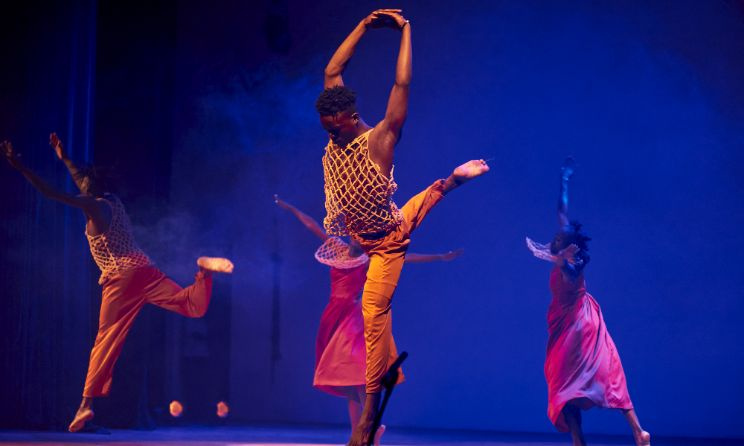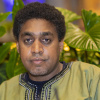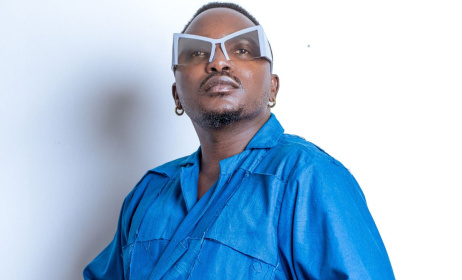Kenya: Fifth Dance Life Festival concludes successfully
The fifth edition of Dance Life Festival returned this past weekend at the Kenya National Theatre in Nairobi.
 Dancers performing Nyawawa – Spirits of the Lake at the Dance Life Festival 2024 in Nairobi. Photos: Goethe-Institut Nairobi
Dancers performing Nyawawa – Spirits of the Lake at the Dance Life Festival 2024 in Nairobi. Photos: Goethe-Institut Nairobi African Roots Dance Group from Tanzania performing Madaraka.
African Roots Dance Group from Tanzania performing Madaraka. Dancers performing Ma’adha, a dance showcasing various traditional rituals and rites of passage of the Pokomo community of Kenya.
Dancers performing Ma’adha, a dance showcasing various traditional rituals and rites of passage of the Pokomo community of Kenya. Dancers performing Frozen Power by Ian Mwaisunga.
Dancers performing Frozen Power by Ian Mwaisunga.
This year, six performances featuring local and international dance groups, including African Roots Dance Group and Muda Africa from Tanzania as well as Forward Dance Company from Leipzig, Germany, graced the stage.
The diverse programme also incorporated musical interludes by Kenyan artists Akoth Jumadi and Ambasa Mandela.
“With this festival, my goal is to challenge how Kenyans view dance, to create an opportunity for them to consume dance as an art form and a profession,” festival curator Adam Chienjo said. “My role is to ensure representation from different genres, genders and backgrounds. I am to connect dancers and choreographers and introduce them to different dance festivals and new audiences every year.”
Held with the support of the Goethe-Institut Nairobi on 13 and 14 July, the festival opened with Sulle Sponde del Lago (On the Shores of the Lake),” where choreographer Alessandro Schiattarella and Forward Dance Company took a critical look at one of the most famous works of classical ballet: Swan Lake.
“Swan Lake is representative of an idealised body image and continues to shape our perceptions and our expectations towards dance to this day,” the organisers said. “Together with the dancers, who have different backgrounds and physicalities, the company’s artistic project director, Gustavo Fijalkow, and Schiattarella question such aesthetically and discursively mindsets and power relations and create an unexplored dance vocabulary.”
The artistry of the African Roots Dance Group in their performance titled Madaraka served up a vibrant story and catalyst for social awareness. The performance bravely portrayed the transformative power that arises when people channel their energy collectively to dismantle the shackles of bad leadership.
With Nyawawa – Spirits of the Lake, Kenyan choreographer Paul Muiruri explored the phenomenon around the concept of spirits of the dead believed to originate from the lake and the cultural practices used to ward them off.
On the second day, Jackson Atulo took the audience through various traditional rituals and rites of passage of the the Pokomo community of Kenya with his performance Ma’adha, while Marion Munga explored conversations in, of and around the womb with her piece Kike.
The colourful festival was wrapped up by Muda Africa under artist Ian Mwaisunga, the creative director, with his latest act Frozen Power. Inspired by traditional Tanzanian ruler Litti Kidanka, who used bees to protect her land from colonial forces, the contemporary dance flavoured with taarab and urban music showcases one woman’s fight for her people.
“The Goethe-Institut Kenya is grateful for the long-standing collaboration with Adam Chienjo,” Goethe-Institut Nairobi director Cristina Nord said. “By connecting Kenyan audiences both with Kenyan and international choreographers and dancers, we provide a glimpse of the power, the aesthetic wealth, and the beauty of contemporary performance arts.
“It’s the first time for us to host a company with diverse dancers and different physicalities that question the aesthetically long-established worldviews, power relations, and body images. In addition, this is the first time that we have commissioned local choreographers to create pieces with dance groups in and outside of Nairobi, namely Tana River and Kisumu.
“There is plenty of talent and creativity outside the capital, and with this edition, we tried to also make this accessible for the audience. Together with the two dance groups from Tanzania, we hope that the audience not only finds inspiration in the performances but also dancers interact and expand their networks beyond national boundaries.”
Besides the Goethe-Institut Nairobi, Dance Life Festival 2024 was also supported by the German Federal Foreign Office, Fachausschuss Basel and Pro Helvetia.
































Comments
Log in or register to post comments